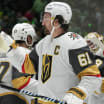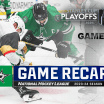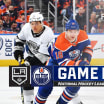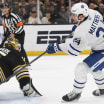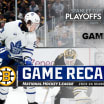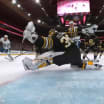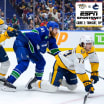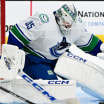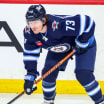Gordie White's life has always revolved around the hockey rink. As a toddler, he would join his father, Ryan, in the locker room of Manitoba of the American Hockey League, would hang around the players, would listen to the coaches. It meant they got to be around each other, and they each loved it.
Son of former NHL center White inspiring after cancer diagnosis
4-year-old 'little warrior' constant sight around minor league locker room, rink
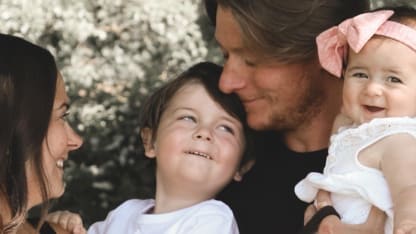
"As much as I could," said Ryan White, who played 313 games in the NHL as a center for the Montreal Canadiens, Philadelphia Flyers, Arizona Coyotes and Minnesota Wild from 2009-17, and for Manitoba from 2018-20. "Every day at practice, I'd get my wife to drop him off and he'd come hang out in our locker room, chill a little bit. I was an older guy at that point. I guess that's probably the best way to describe him, he got to grow up around there."
Which is why it's so gratifying for Ryan to see Gordie now. Gordie, now 4, is back to hanging around locker rooms and ice rinks, able to scribble plays on the white board or skate off himself, especially with the 6-year-old son of fellow former NHL player Justin Falk, the coach and general manager of the Winkler of the Manitoba Junior Hockey League, where Ryan has been an assistant coach.
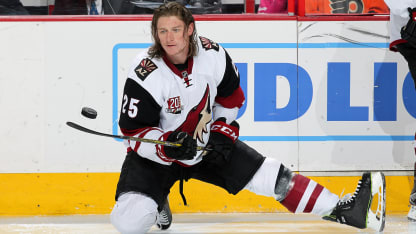
© Len Redkoles/Getty Images
It's a life that wasn't -- and still isn't -- assured for Gordie, for the White family, as they stared down the worst possible news back in February.
Gordie had been diagnosed with diffuse intrinsic pontine glioma, a rare and difficult to treat cancer in which a tumor occurs in the brain and spinal cord and impacts crucial bodily functions, like walking, talking and eating, though it does not affect mental function. According to the ChadTough Defeat DIPG Foundation, an organization founded in memory of 5-year-old Chad Carr -- grandson of former University of Michigan football coach Lloyd Carr -- and 6-year-old Michael Mosier, DIPG has a near zero survival rate. Ninety percent of children diagnosed with DIPG, typically between 4 and 11 years old, die within two years and most within 9-12 months.
But Gordie, right now, nine months after diagnosis, is stable. And he's able to be at the rink.
"The toughest thing for us last year was when everything went down, he was away from it," Ryan said, his voice growing thick. "It just always seemed to be like an escape for me from everything. For him, I think it's really been such a positive experience. He just really goes to the rink and he's a kid.
"It seems like the rink's really groomed Gordie and raised him as much as I have."
The first indications of something amiss included a droop to one side of Gordie's face and a favoring of one arm. He would clench the arm sometimes, holding it over his stomach, and it stuck out to Ryan's mom, staying with the family to help out with the new baby they had in December.
On a day off, they took Gordie to the hospital in Brandon, Manitoba. He got a CT scan, which led to a trip to Winnipeg, where there were more sophisticated hospital facilities, that same day.
There were more tests, more MRIs and more hope. Then came the diagnosis on Feb. 18.
"It was probably the worst thing we could have gotten," Ryan said. "I didn't know anything about DIPG, my wife had never heard of it. When the doctors came in, we both knew it was going to be a tough situation, a tough conversation.
"The options that we got right away weren't any at all. It was radiation and a timeline of how things were going to go south for Gordie. We could eradicate it and hope for some more time, but basically that was it."
But that wasn't where it ended.
When the Whites got home, friends had started a GoFundMe page, getting the word out about the cancer and the family's plight, which has now raised $199,249 in Canadian funds, from a list that includes many familiar names.
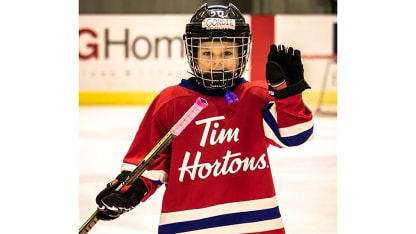
The hockey world began reaching out, starting with Chciago Blackhawks defenseman Jarred Tinordi and his wife, Stevi. She was the one who suggested ChadTough, which provided new and different options for the family. Others have followed. The opponents -- who really make Ryan choke up -- and the teammates and coaches, the Canadiens, the Philadelphia Flyers, their alumni, even the NHL referees and beer league players.
But it's especially the Winkler Flyers and what they've done in supporting the family, and Falk that means so much to the Whites.
"To have him in my corner here last year, and the support from that organization, I don't think people understand what hockey can do sometimes," Ryan said. "For us, being back at the rink and having an opportunity for Gordie to be in a locker room and be around a team like that is just so special.
"I know I'm going through a lot of things right now and that door has always been open. [Falk] has been more than a brother in a lot of ways the last year."
Falk, who played 279 NHL games with the Wild, New York Rangers, Columbus Blue Jackets, Buffalo Sabres and Ottawa Senators from 2009-19, and White have known each other since their junior hockey days. And he has welcomed Gordie with open arms.
"He does everything. He's interacting with the players. He's on the ice skating. He's in the gym playing soccer. He's on the coach's board drawing up plays," Falk said. "For a little guy that you wonder, 'Oh, is he going to be a hockey player?' he might just as much be a coach. He just loves every aspect of the game, and a guy that could spend all day every day at an arena. He takes after his dad."
In addition to the radiation treatments, which lasted for six weeks, Gordie is on a high dose of marijuana and has enrolled in ONC201, a Phase 1 trial in Rochester, New York, for pediatric patients with DIPG and recurrent/refractory H3 K27M gliomas. The family goes to New York for the trial every eight weeks, and made their fourth trip Nov. 6. The hope is the trial drug will help prevent a recurrence, which is the problem with radiation treatments -- they can work, but not permanently.
Now, Gordie is doing well. His MRI shows his disease is stable, though it was decided not to do a biopsy because of the location of the tumor in his brain and its importance to function.
But this is something the Whites never would have expected nine months ago, when they were handed a timeline of 6-11 months.
The symptoms have gone. His life is, for the most part, normal. They are trying to live every day the best they can, treasure the moments, to buy Gordie time for more and better treatments, to make these good times permanent, though they know there are no assurances.
"For me, the biggest thing I've learned from him is he seems to be a little warrior and he seems to be a little hockey player," White said. "He's a little fighter. He's always having fun and always smiling. Making me laugh. I think that's probably been the biggest thing in all this, he's been a rock for all of us.
"He walks into a room and everyone seems to light up and have fun. So it's been special here the last little bit. Trying to enjoy as much time as we can with him."
And, as always, they hope there is more time with Gordie, more time at the rink, more time for hockey.
"He doesn't give up," Ryan said. "We're not going to give up either."
